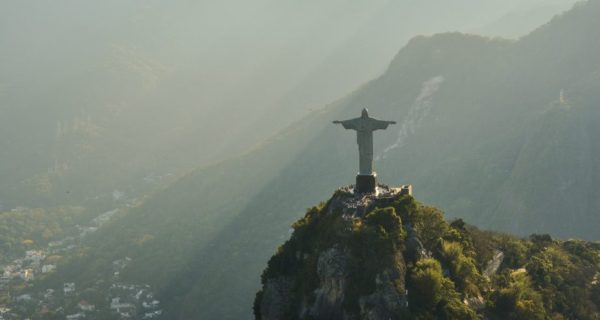“One thousand, seven hundred and twenty this week,” Luiza said. She was seated at the kitchen table, painstakingly adding up columns of figures.
It had taken work. Luiza had gotten Isabella Gomes up to the cross. Isabella, Luiza knew, loved the attention of being sick. Somehow, with Luiza there, Isabella realized that there would be even more attention if she were miraculously cured – and she was. She talked about her cure to anyone who would listen – willingly or not.
Then Manoel Chagas felt he was coming down with the flu – so he rode his horse over by the cross and said a prayer to Our Lady – and, sure enough, he didn’t get sick. Ana Valencia, nearly nine months pregnant, heart-sick worried about the new baby, made her way up to the cross – and the baby was born, healthy and happy – her fifth.
A teenage girl said she actually saw Our Lady there. Then another claimed, she’d seen her too. A third said that, of course they had, as Our Lady had always appeared there – she’d seen her lots of times – but just hadn’t said anything to anyone because it was a secret.
Word spread, and not only people from the surrounding areas came, but people from Milagres, Valencia, and Jequié. Then, as time passed, from even further – Feira da Santana, Vitória da Conquista, an excursion bus from Salvador.
“That young man cured of epilepsy. Did you hire another actor?” she asked Luis Antonio.
“It doesn’t hurt to grease the wheel,” he replied.
“Be careful,” Luiza said. “We have a good thing going. Don’t risk it. Two thousand, nine hundred, and twelve this week,”
People climbing the hill were thirsty, so they started selling drinks. And hungry – so they set up a food stand. A neighbor asked to sell home-made popsicles, so they rented her space for a booth. Zé Grilo noted that many husbands were dragged up there by their wives – they might need beer and (quietly, under the table) cachaça – so he rented a booth also, and did a booming business. The pharmacist from town thought people might need a few band-aids and remedies.
“But that’s ridiculous,” Luiza said. “This is a place where people are cured.”
“Our Lady isn’t going to cure every headache, every cut, every case of diarrhea,” the pharmacist said. At least he hoped not. “Let me give it a try.” So, they did – and it worked; the little booth was profitable.
One evening Luiza turned to Luis Antonio. “That kid whose broken arm was healed – that was good. Where did you find him?”
“What kid?” Luis Antonio asked.
“You didn’t hire the kid?” Luiza looked at him, sharply. But Luis Antonio looked genuinely puzzled. And besides, he’d never been able to hide anything from Luiza.
Duca began to feel uncomfortable.
***
“Three thousand, four hundred and seventy-seven this week,” Luiza said.
It was Sunday. The hill was alive with people. Pilgrims. Vendors. Zé Grilo selling beer. The pharmacist chatting with customers. Stands selling souvenirs, scarves, sun-glasses; candy, cigarettes, T-shirts.
Duca looked around. His idea. He felt proud of his idea – proud that it had been brought to fruition, proud – just as an artist feels proud – to see his idea take on concrete form, bright colors, lively sound.
Yet, like an itch on the back of his neck, there was that discomfort.
Suddenly everything went silent.
Duca could see that people around him were still talking, laughing, buying and selling. But he couldn’t hear them. It was as though someone had turned off the sound. He could see Luis Antonio, finishing up the sale of soft drinks to a young couple. As if feeling his gaze, Luis Antonio glanced toward him.
Then Duca noticed Luiza. She was down on her knees, her eyes fixed on the cross, hands held in prayer, lips moving silently. He had seen her act it out before – she was much better at it than he would be – but never this intensely, this convincingly.
‘What an amazing wife I have,’ he thought.
The itch at the back of his neck grew stronger. He brought his hand up to slap it and turned around.
He froze, mouth dropping open.
Floating over the cross, in mid-air, was the most beautiful woman Duca had ever seen. She wore a green mantle, and her dark hair flowed, curling down over her breast. Her oval, olive-toned face was loving, her dark eyes tender, but piercing. She looked at him, shaking her head gently; the reprimand of a tired mother.
“Duca, Duca,” she said. “What have you been doing?”
He dropped to his knees, his mouth bubbling incoherent apologies. So focused was he on his own fear, he didn’t see his brother-in-law staring across at him in wide-eyed confusion, as if wondering why he’d suddenly gone crazy.
The End


1 thought on “All Things Visible and Invisible Chapter 3”